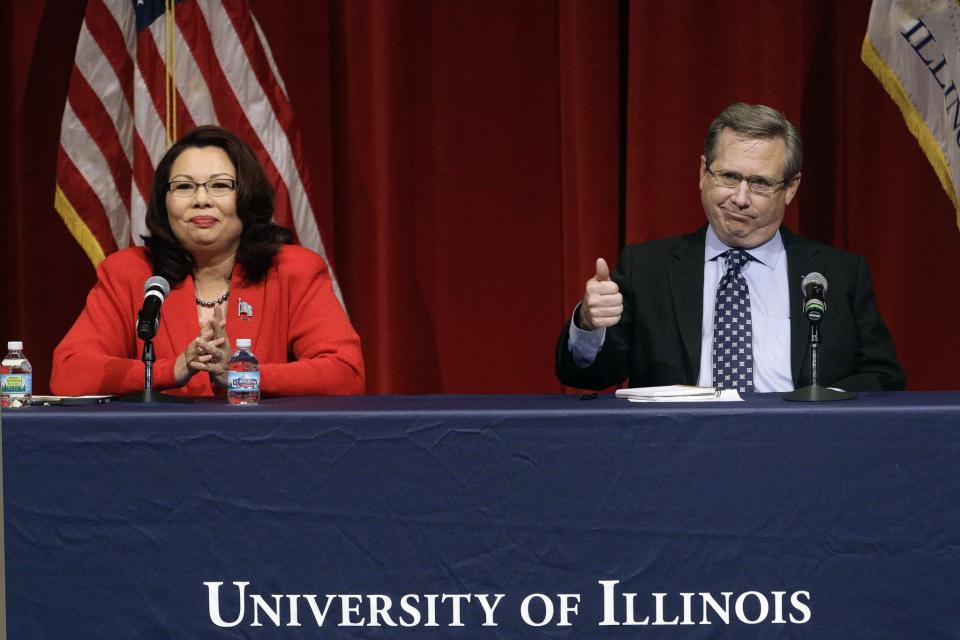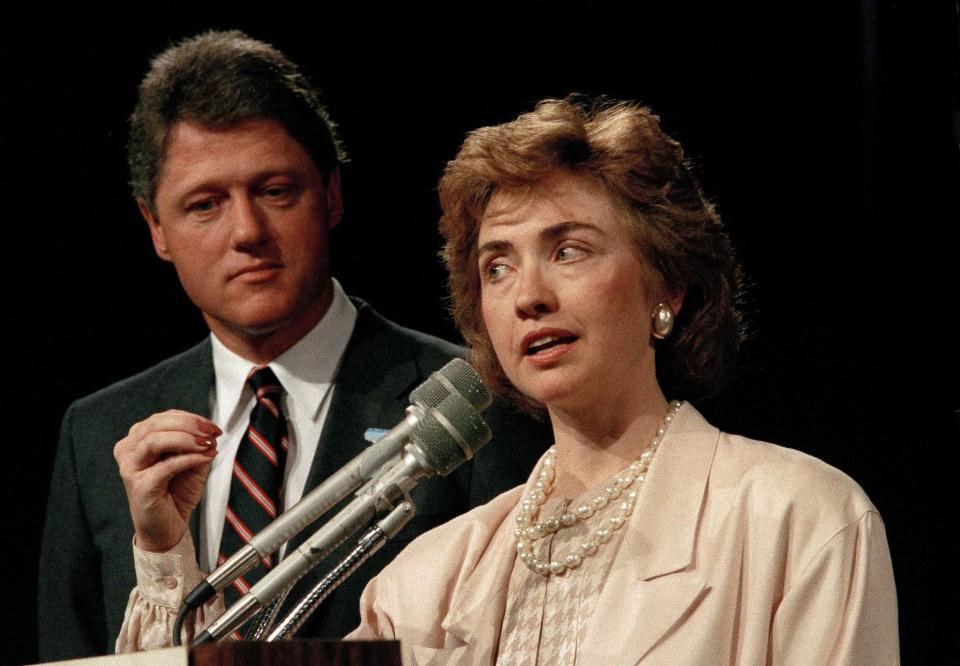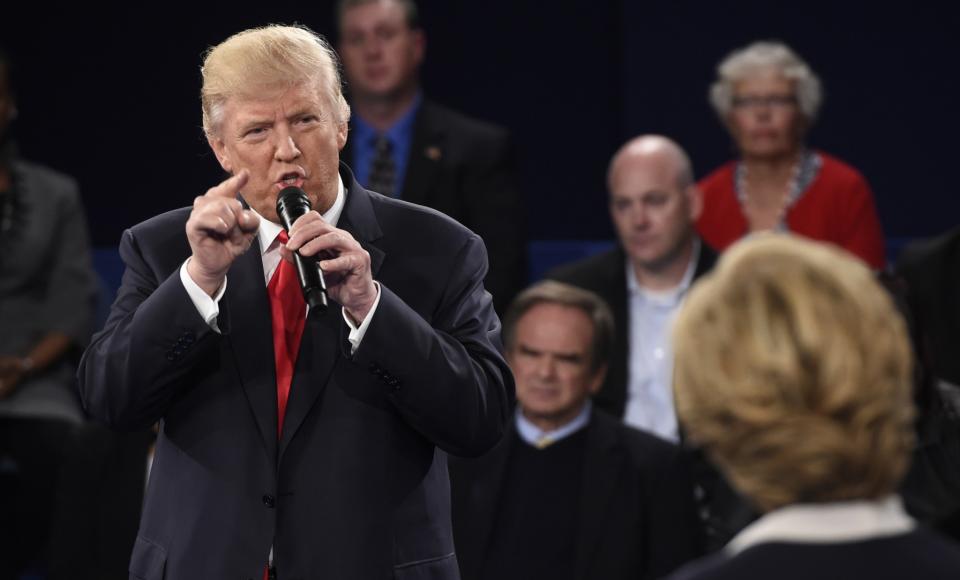How Clinton vs. Trump upended ideas about gender and politics
![Photo illustration: Yahoo News, photos: AP [3], Getty Images.](https://s.yimg.com/ny/api/res/1.2/Dy9dMmNRS1aTTX8bZISR_g--/YXBwaWQ9aGlnaGxhbmRlcjt3PTEyNDI7aD02NzY-/https://media.zenfs.com/en/homerun/feed_manager_auto_publish_494/f1dea4c88bdcde7283dd5e84911d0790)
Among the postmortems of this most unusual election will be the one by academics and advocates who have spent their careers aiming to put a woman in the White House — and who supported getting Hillary Clinton there. Much of what they’d learned over the years about how to run as and against a woman has been turned upside down this time around. That leaves the question of whether the Trump-Clinton clash was an exception to the rules or a rewriting of them.
“All the years of working toward this goal,” says Marie Wilson, a former head of the Ms. Foundation and the creator of the White House Project, which has trained more than 15,000 women to run for office since 1998, with the ultimate prize being the presidency. “It’s completely different from the race we’d assumed and hoped. And it makes you wonder whether this is a new norm.”
Here’s a look at some of the decades of accumulated “rules” and how they’ve recently been broken.
_____
You don’t attack a female opponent.
Remembering how recently that was regarded as an absolute truth makes everyone interviewed for this story laugh.
“Yes, that one used to be ironclad,” says Debbie Walsh, director of the Center for American Women and Politics at Rutgers University, which was founded in 1971, back when women held two seats in the U.S. Senate, 13 in the House of Representatives and not a single one in a governor’s mansion. “Every study, every expert, everything we knew about women’s campaigns was clear that when you run against a woman you don’t attack.”
Ruth Mandel, director of the Eagleton Institute of Politics, also at Rutgers (and founder of the center that Walsh now runs), agrees: “You can’t attack a woman. How can you run as a man attacking a woman? This would hurt your image — it would turn off voters.”
Then, mentioning the many times Donald Trump has done exactly that to Clinton, she adds, “I guess that’s not a problem anymore.”
So does this mean all gloves are off for both genders from now on? Not necessarily. While Trump’s attacks on Clinton in general seem to have worked for him, another male candidate was paying the price for similar insults. In the race for Senate in Illinois, Republican incumbent Mark Kirk spoke disparagingly of his Democratic challenger, Rep. Tammy Duckworth, questioning her half-Thai heritage as unpatriotic, even though her ancestors fought with George Washington and she herself is a veteran who lost both legs in battle. He was dinged in the polls. Still, that was an attack seen more as racist than sexist.

Which seems to muddy the lesson into something like this: You should be careful attacking a woman unless you are Donald Trump and your brand includes attacking everyone.
Women are assumed to be more honest.
That has long been a staple of female campaigning: Voters will give de facto credit to a woman candidate for honesty. That was how many of the early successful female candidates positioned themselves, as virtuous outsiders coming to clean up a system filled with corrupt insiders.
Not so in this election. Now it is the woman who is seen as the insider and the man who presents himself as the outsider who can fix things and isn’t beholden to outside interest groups or elites.
Trump has labeled his opponent “Crooked Hillary” and repeatedly called her a “liar.” It can be argued that he’s made this accusation stick not just to his opponent but to her entire gender. “He’s bundled all women into this untrustworthy category,” says Wilson.
By way of example, she cites the high percentage of women reporters Trump publicly accuses of deceit, and the fact that he’s said all the women who’ve accused him of sexual impropriety are lying.
Not only is Clinton not presumed to be more honest because of her gender, experts say, but even when there is statistical evidence — Politifact finds that 70 percent of Trump’s statements in this campaign are “mostly false,” “false” or “pants on fire,” compared with 26 percent for Clinton — she still is not accorded the perception of trust. (It should be noted that he isn’t seen as particularly honest either: A recent ABC poll found 46 percent of likely voters describe him that way, while 38 percent say the same about Clinton. Her supporters point out that this is a result not only of Trump’s recent attacks, but also of Republican attacks on her honesty almost since the day she became first lady.)

“Somehow the man who has been proven to discriminate against minorities in his business, to not pay his contractors, and who has a fraud trial starting after Election Day for Trump University is seen as the honest straight shooter,” says Kathleen Hall Jamieson, director of the Annenberg Public Policy Center and author of “Beyond the Double Bind,” about overcoming obstacles to women’s leadership. At the same time, she says, “people are shouting ‘lock her up’ when she has been investigated more than anyone in history and there have been no resulting charges.”
Women have to overcome looking weak and emotional, while men are assumed to be strong and decisive.
Again, that was long considered true until it wasn’t. Clinton, Jamieson says, “has more than passed the commander in chief test, where even people who aren’t voting for her say she is capable of that role. You would have suspected that would be the main barrier to a woman for president.” But instead it is presumed that she is prepared for the task — and that preparation is, in turn, an unexpected obstacle.
On the other hand, Jamieson argues, Trump has displayed all the behavior that would have been criticized as weak and overly emotional if he were female. Yes, he runs on tough ideas — law and order, building a wall — but at the same time “he fits all the traditional stereotypes that have been used to shut down women,” she says. “He’s thin-skinned, he acts on impulse, he can’t seem to get the details right, he’s scatterbrained and goes off on tangents.” By way of example, she cites Trump’s off-message, often weeklong rants against those he believes have insulted him, his reversal of positions sometimes within days or hours, his denial of having said things that are on video for posterity and his frequent misstatements of fact.
Women start small, men start big.
Studies and surveys find that women do not believe they are qualified for higher office until they have served at lower levels. Voters seem to expect that of them too. “What’s the first office you are qualified to run for?” asks Laura Liswood, secretary-general of the Council of Women World Leaders, whose membership is 60 women who have led their countries as president or prime minister. “Women say it’s the local school board. Men figure they’ll start with city council, even Congress. Women build their ambition. Men leap to their ambition.”
Trump has certainly leaped to his — the first office he’s ever sought is the presidency. But Clinton certainly didn’t start with the school board, either. She took the historically old-fashioned role of first lady and used it as a springboard in a way no woman had ever done before, straight to statewide office, as senator from New York, and then, of course, secretary of state.

“Hers is hardly the résumé of most female politicians,” Mandel says. But perhaps having to start at the most local levels of government is, she says, “another assumption that should change.”
Yes, or maybe all it means is that there are different rules for a race between Hillary Clinton and Donald Trump.
“That’s what I am asked most often lately,” says Erin Vilardi, the founder of VoteRunLead, which was originally part of the White House Project and is now a separate entity training women to run for office. “Is this Hillary, or is this all women? Is this just the reality of this campaign, or of all campaigns by women? Is this just the White House, or all the way down the electoral ladder?”
Certainly this is a campaign like no other. Trump is a singular candidate, breaking the rules not only of how to run against a woman but of how to run at all. He has an ability to get away with what no other candidate can. To wit, when Marco Rubio attempted to get down in the dirt with him over the size of his hands, it was the beginning of the end of Rubio’s candidacy.
Similarly, Clinton is arguably one of a kind, as most firsts in any category tend to be. “It took a unique human being to get here,” Walsh says. “She’s a boundary-crossing leader. So you can’t say that what is true for her will be true for other women who will come after her.”
She and other experts interviewed for this article agree that in many ways it would be a good thing if the old stereotypes no longer apply — if women no longer assume the need to start at the bottom, or have to overcome the idea that they are weak or emotional.
But this potential silver lining lies within what they see as a dark and worrisome cloud.
“Those of us who are schooled in unconscious bias were expecting to spend the election pointing out the sophisticated ways that unseen expectations can work against a woman,” says Gail Evans, who created Working Mother magazine and is a founder of Executive Women for Hillary, a fundraising group. “But this isn’t unconscious anything. This is conscious misogyny. Who would have thought this would be a campaign about women’s bodies, women’s periods, women’s truthfulness?”

Says Wilson: “To hear people talking about hurting her, to hear people talking about killing her? All this misogyny that we like to think is not that deep? It is that deep.”
Too deep, they worry, to disappear with this campaign. So deep that it will, in fact, influence others to come.
If Clinton loses, they fear that will have a chilling effect on other campaigns by women. And if she wins, they assume the vitriol of the campaign will make it tougher for a woman to govern. If the old rules are obsolete, or even dented, they wonder, what should the new conventional wisdom be?
“I’d love to see a couple more female self-indulgent, self-described billionaires running for office,” Liswood says.
It’s not entirely a joke.
_____
Related slideshows:
Hillary Clinton and Donald Trump hold final rallies on Election Day eve >>>
Donald Trump’s America, Part 2 >>>
Donald Trump inspires his own brand of fashion on the campaign trail >>>
Face-off: Documenting the expressive battle between Hillary Clinton and Donald Trump >>>



